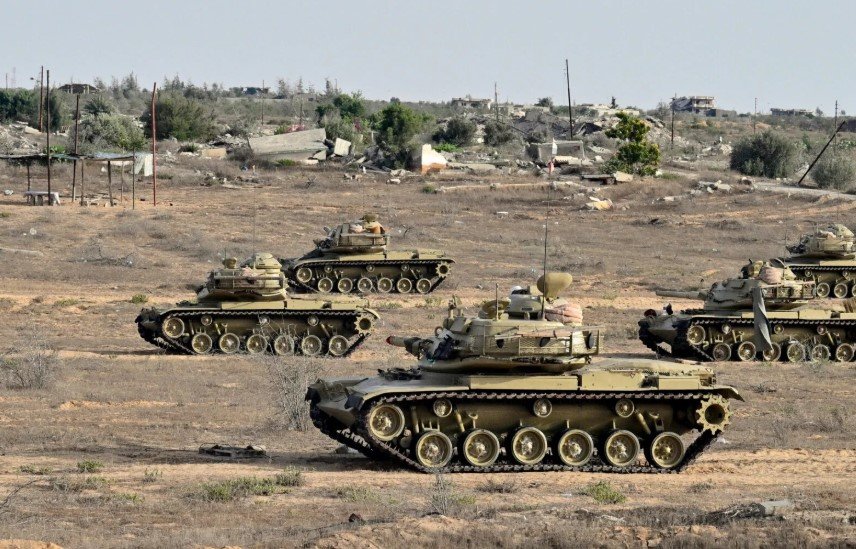Border tensions, refugee fears, and Sinai’s deep-rooted instability put Cairo in an increasingly uncomfortable bind
The war in Gaza may technically be next door, but for Egypt, it’s already reached home. The Sinai Peninsula—long a soft underbelly in Egypt’s security apparatus—is once again at the center of fears, suspicions, and silent maneuvering as the conflict between Israel and Hamas drags on into its most violent phase yet.
For many Egyptians, Sinai isn’t just a border zone. It’s a symbol of national pain, a corridor of smuggling, a land of forgotten tribes, and a red line no leader wants to see crossed. But as Gaza burns, Egypt’s old wounds are being reopened in real-time.
Sinai’s Fragile Calm Is Fraying
The Sinai Peninsula is no stranger to turbulence. After decades of neglect and years of insurgency, Cairo had finally begun to exert tighter control over its eastern frontier. But Gaza’s war has undone much of that quiet.
In North Sinai, intelligence sources say the Egyptian military has increased patrols and reactivated aerial surveillance. Civilian movement has slowed. Checkpoints now dot the already-desolate roads more frequently.
One officer stationed near Rafah, requesting anonymity, said bluntly: “Every explosion in Gaza shakes the ground here.”
And yet, it’s not Israeli bombs that worry Egypt the most—it’s the people trying to escape them.
Refugees at the Gate, Borders Stay Shut
Cairo has made it painfully clear: Sinai will not become Gaza’s backup plan. The idea of allowing mass refugee flows into North Sinai—something pushed by some Western voices—has been met with stiff rejection from President Abdel Fattah el-Sisi’s government.
Privately, officials admit they fear what such an influx would mean:
-
A flood of Hamas-affiliated militants hiding among civilians
-
A permanent demographic shift in Sinai’s already delicate tribal balance
-
The long-term possibility of Israeli forces pushing Palestinians across the border in wartime calculus
Even ordinary Egyptians, despite cultural ties to Palestinians, seem to back the government’s hard line. A recent poll by the Egyptian Center for Public Opinion Research found 68% of respondents opposed opening the Rafah border for refugee resettlement.
That tension—empathy on the surface, but anxiety underneath—is visible everywhere.

The Public Mood Is Bitter and Blurry
There’s a strange contradiction in how Egypt sees Gaza. On talk shows, the messaging is often pro-Palestinian. Government-aligned pundits criticize Israel’s tactics, call for ceasefires, and highlight civilian suffering.
Yet in private conversations and online forums, many Egyptians express fear. Not of Israel or even of war itself—but of instability spilling into their own streets.
Some of the concerns voiced include:
-
“What if Hamas uses Egyptian land to regroup?”
-
“What if the tunnels start reopening?”
-
“What if we become the new front line?”
One Cairo-based professor put it like this: “We’ve already got a volcano in Sinai. Why add gasoline?”
Bedouins, Smugglers, and Militants: A Powder Keg in the Sand
The tribal heartland of Sinai remains a wild card. The region’s Bedouin communities—especially near Rafah and Sheikh Zuweid—have long had ambiguous ties to both Egyptian authorities and Gaza’s militants.
While the Egyptian army has worked to cut down on smuggling and neutralize insurgents, the vast desert terrain and familial ties across the border mean influence remains porous.
A UN-backed 2024 report estimated that nearly 35% of Gaza’s goods during wartime entered via Sinai smuggling networks, despite intensified surveillance.
Here’s a brief snapshot of key Sinai dynamics:
| Group/Entity | Role in Sinai-Gaza Border |
|---|---|
| Egyptian Military | Patrols border, controls Rafah crossing |
| Bedouin Tribes | Historically involved in smuggling and trade |
| Hamas Tunnels Units | Use tunnels to evade Israeli strikes and bring in weapons |
| Gaza Civilians | Seek temporary refuge, often blocked at border |
| International NGOs | Face restricted access from Egypt’s side |
Local tribal elders have warned Cairo that any major incursion—either by Israel or a refugee flow—will destabilize their communities.
The Suez Canal Fear Factor
Beneath the surface of military movements and border rhetoric lies another key worry for Egypt: the Suez Canal.
As one of the country’s top foreign currency earners, the canal is seen as untouchable. But Sinai instability has, in the past, created disruptions. In 2015 and again in 2017, insurgents fired rockets near the shipping lanes, prompting international concern.
With Houthis in Yemen threatening Red Sea trade and Gaza heating up, Egyptian officials are quietly fortifying positions along the Suez axis.
“Any escalation in Sinai could send insurers into panic mode,” said an analyst at a Gulf-based logistics firm.
One paragraph. One fear.
Cairo’s Calculated Coldness Toward Hamas
Unlike Qatar or Turkey, Egypt has no love lost for Hamas. While it maintains contact for mediation purposes, Cairo views the group as a liability—especially after years of outlawing the Muslim Brotherhood domestically.
Egyptian intelligence officials have held backdoor meetings with both Israeli and Palestinian sides, but Cairo’s priority has been to keep the conflict out, not end it outright.
“The goal is not peace,” said a retired Egyptian general. “The goal is stability on our terms.”
That explains why Egypt has blocked arms transfers to Gaza, increased troop deployments in Rafah, and rejected proposals for temporary camps for refugees inside Sinai.
It’s a cold strategy—but one Egyptian officials argue is necessary.
A No-Win Situation, Managed by Fear
Egypt’s Sinai dilemma isn’t new, but it’s far more combustible today. The government is trying to prevent a catastrophe, but it’s doing so with clenched teeth and clenched fists.
Publicly, Cairo talks peace. Privately, it braces for chaos.
There’s no neat solution. No perfect answer. Just an endless tightrope stretching from the Israeli border to the gates of Cairo—with Sinai’s dry winds blowing uncertainty at every step.
